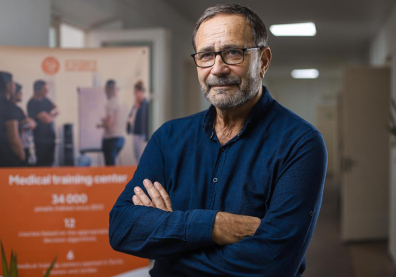Ukraine Syria: the humanitarian doctor facing the Russian war machine

Speaker
- Raphaël Pitti, French anesthesiologist-resuscitator, specialist in war medicine and founding president of the medical humanitarian NGO HuSoMe (Humanité Solidarité Médecine)
The event will be moderated by
- Denis Lakine, CREE doctoral student, Inalco
This event can be followed in full on Zoom (connection link).
Scientific event presentation
Russia's large-scale invasion of Ukraine has entered its third year, plunging the country into a conflict of unprecedented violence in which civilian populations are the first victims. Although more than 12,000 people have already died - not counting the countless acts of violence and crime that have marked this war, such as the massacres at Boutcha and the bombing of the Okhmatdyt paediatric hospital - this tragedy does not represent a break with the past. On the contrary, it is part of a continuum of violence systematized by Russia since the Chechen wars. Massive destruction of civilian infrastructures, indiscriminate bombing, the use of siege and terror as instruments of domination: in this torrent of suffering, humanitarian actors are trying to provide essential relief, but at what price? Faced with a war that tolerates neither neutrality nor interference, how do they manage to make their way to the battered populations?
A long-standing emergency physician and humanitarian, Professor Raphaël Pitti has been involved for years in the most trying theaters of war. Founder of the NGO HuSoMe in 2018, he has worked in close proximity to the victims in Syria and Ukraine, not only assisting the wounded, but also structuring training and medical aid schemes to perpetuate humanitarian action in disaster zones. A first-hand witness to the ravages of the Russian war machine, he sheds a rare light on the brutality of the conflict and the challenges facing those trying to remedy it.
At the invitation of Inalco and CREE, Professor Pitti will bring his eyewitness account of events and deliver a lucid, committed analysis of the realities on the ground, between humanitarian imperatives, political pressures and constant peril.
Speaker's biography
Raphaël Pitti is an anesthesiologist resuscitator, associate professor of val de grace in emergency and disaster medicine. His career began in the French Army Medical Corps, where he held the rank of General Medical Officer until 2004, then became head of intensive care units in various French hospitals, while also teaching. His field experience covers countries on several continents, from the Middle East to Africa, the Maghreb, South America and the former Yugoslavia. He is considered a specialist in war medicine.
His expertise has led him to become an official advisor to a variety of national and international institutions, such as the Baghdad Emergency Center Renovation Program, the NATO Emergency Medicine Working Group and the International Civil Protection Organization in Geneva. (ICDO). He was vice-president of the international strategic research institute for population protection in Lyon (IRSIPP).
Most of his experience over the past ten years has focused on humanitarian action around the world, both in field work and in training missions such as defending Bulgarian nurses, participating in the care of migrants in Lampedusa (Italy). His main achievement and commitment since 2012 with UOSSM, has been to set up an emergency medicine training program for doctors, medical students, nurses/midwives and first-aiders including white helmets in Syria, which has trained over 34,000 people to date. This has involved 33 trips to Syria to set up four training centers in Syria and train future trainers despite the constant bombing and destruction of hospitals. He is also a Metz city councillor responsible for health and social emergencies. He initiated the friendship charter signed in 2013 between the city of Metz and the Aleppo Civil Committee. He is a Knight of the Légion d'Honneur and an Officer of the Ordre National du Mérite. In 2016, he received the Prix de l'Engagement Démocratique from the Grand Est region.
In 2017, outraged by the government's reception conditions and repressive attitude towards asylum seekers, he returned his promotion to Officer of the Legion of Honor, in protest against the French state's treatment of migrants, which he describes as "undignified", as well as its migration policy.
He is the author of a book published in 2018 by Tallandier "Va où l'humanité te porte" Un médecin dans la guerre, which retraces his commitment.
Since the start of the war in Ukraine he has traveled to the Polish border to repatriate 236 refugees at the initiative of the Mayor of Metz, and to Ukraine to set up two emergency medicine training centers in Lviv and Kharkiv for Ukrainian health personnel, both civilian and military. Ten doctors from the Ukraine were trained in Metz to be the first trainers at the two centers. Since then, 5,500 civilian and military health and rescue professionals have been trained at these centers over the past fifteen months.
These training courses, based on the damage control concept, aim to train health and military professionals to rescue the wounded on the frontline. This approach stresses the need to carry out summary interventions as quickly as possible, lasting less than an hour, incomplete certainly, but life-saving, rather than interventions that take too long and could cause the patient's death.
In 2018, he created HuSoMe (ex- UOSSM Grand Est), which is a medical humanitarian NGO. HuSoMe works in theaters of war such as Syria, Ukraine or Gaza, and trains medical staff in emergency medicine. The NGO also develops programs to improve people's access to primary healthcare.
Organization
- Denis Lakine (CREE, Inalco)